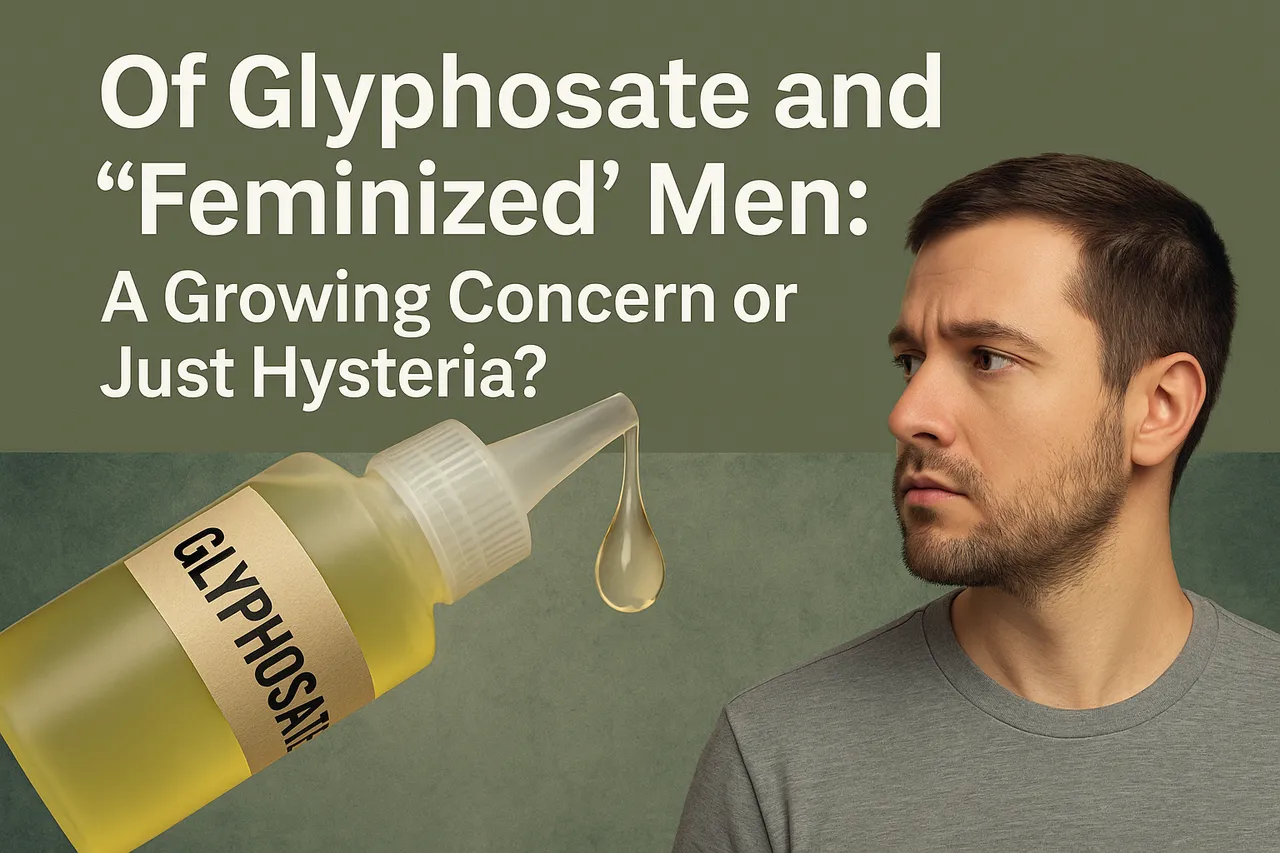Yesterday, I stumbled on a thread on X that honestly made me roll my eyes at first glance. Someone had linked the so-called feminization of men to glyphosate, the infamous weedkiller found in much of our food chain. It has to be another online conspiracy theory, I muttered to myself, but the replies had me sitting up. Hidden among the usual banter were links to peer-reviewed journals and references that made one thing clear. It seems I dismissed this issue too quickly.
Let me be clear, I’ve never liked glyphosate. I’ve written, tweeted, and spoken against its use for years, especially considering its rampant application in agriculture across Africa. I still remember the first time I discovered that imported wheat, soy, and even local maize could carry glyphosate residues due to pre-harvest desiccation. It felt like betrayal. And now, to hear it might be messing with our hormones? That deserves a deeper dive.
Glyphosate: Ubiquitous and Controversial
First, a primer. Glyphosate is a herbicide developed by Monsanto (now Bayer) and widely used across the globe. In Nigeria, it’s found in countless agricultural products, often unlabelled and unregulated. Farmers use it not just to kill weeds but to speed up harvests, especially in wheat farming. Its presence in our food supply is no longer a question of if, but how much.
The controversy around glyphosate mostly centers on cancer risks. The WHO’s International Agency for Research on Cancer (IARC) declared it probably carcinogenic in 2015. But emerging research is shifting attention from just cancer to endocrine disruption. And that’s where things get interesting and worrying.

Endocrine Disruption: What It Means
An endocrine disruptor is any substance that interferes with the hormonal system. This includes natural hormones like testosterone and estrogen, which regulate everything from sexual development to mood, metabolism, and fertility.
A 2019 study published in Toxicology Reports explored glyphosate’s potential as an endocrine disruptor. It found that even at low doses, glyphosate and its commercial formulations could alter hormone activity in human cell lines. While the mechanisms are complex, the basic idea is that glyphosate may mimic or block hormonal signals, particularly those involved in testosterone regulation.
Another study from Environmental Health (2020) found that maternal glyphosate exposure in rats led to altered sexual development and reduced testosterone levels in male offspring. While rodents aren’t humans, this type of toxicological evidence is often the early warning bell in public health debates.
A Real Phenomenon?
Now to the part people are talking about. I mean, the supposed feminization of men. This phrase often comes loaded with cultural bias and internet mockery, but behind the noise is a genuine scientific concern - declining testosterone levels and male fertility.
A widely cited meta-analysis published in Human Reproduction Update (2017) showed a staggering 50% drop in sperm counts among men in Western countries over the past 40 years. Researchers are still unraveling the causes, but environmental pollutants, including endocrine-disrupting chemicals (EDCs) like glyphosate, are high on the suspect list.
In Nigeria, there’s a growing, if under-reported, concern about male fertility. Anecdotally, fertility clinics are seeing rising numbers of men with low sperm counts and hormone imbalances. Yet we rarely trace this back to food safety or agricultural chemicals.
The African Angle: Double Jeopardy
Let’s be honest, we’re in a uniquely vulnerable position. Developed countries may argue endlessly over glyphosate’s safety, but at least they have regulation, monitoring, and food labeling. In Nigeria and much of Africa, we face unregulated imports, zero residue testing, and poor consumer awareness.
Farmers mix glyphosate with their bare hands. Traders spray it to preserve beans. And the average person eating bread, suya, or jollof rice has no idea whether their ingredients carry chemical baggage. Add that to our shaky healthcare and weak environmental policies, and you’ve got a silent cocktail brewing.
I often say: Africa doesn’t just import products, we import risks.
Why the Science Deserves Our Attention
It’s easy to dismiss concerns like this as alarmist. But science doesn’t need to be conclusive to be cautionary. Glyphosate isn’t a lone villain but a part of a broader web of EDCs found in plastics, cosmetics, and pesticides. What makes it uniquely problematic is its sheer ubiquity. You can avoid perfume; you can’t avoid food.
Even Bayer, after acquiring Monsanto, has faced billions in lawsuits and has begun phasing out glyphosate-based products in some markets. The European Union, after years of heated debate, is still divided on its renewal. When billion-dollar industries are wobbling, you have to ask: what do they know that we don’t?
So, What Do We Do?
As citizens, we must demand better regulation and transparent labeling. We need residue testing labs, local research, and farmer education. If you can, buy organic. If you grow your own food, avoid glyphosate-based herbicides. And please, don’t let someone spray preservatives on your food at the market.
As for the link between glyphosate and hormonal shifts? The science is still evolving, but the warning signs are flashing. It’s no longer about whether glyphosate can mess with our bodies; it’s about how long we’re willing to ignore the evidence.
In the end, it’s not just about feminized men or declining sperm counts. It’s about sovereignty over our bodies and our land. If we don’t fight to detox our food chain now, we may be handing the next generation a future that’s biologically, culturally, and agriculturally compromised.
And that’s not a conspiracy theory. That’s just common sense backed by science.